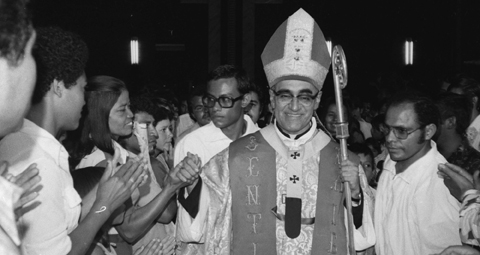October 12 | ![]() 0 COMMENTS
0 COMMENTS ![]() print
print

Salvadorian saint is a global hero
SCIAF Director Alistair Dutton talks one of his biggest inspirations: Blessed Oscar Romero
THE canonisation of the Blessed Oscar Romero on October 14 will see thousands gather in Rome and millions around the world celebrate a momentous event in the life of the Church. It also holds special significance for the Scottish Catholic International Aid Fund (SCIAF).
Oscar Romero is one of our patrons and a shining example of someone driven to fight poverty and injustice to the point of sacrificing his own life. He has been a huge inspiration to SCIAF and many others throughout the global Caritas family for many years.
His example of fighting poverty and injustice inspires every aspect of our work and any day in which we succeed in emulating his example, even in a small way, is a good day.
Personally, I’ve always found his life a powerful example of someone who has faithfully maintained their commitment to those who suffer at the hands of others.
I saw the film about his life and read his writings while I was a Jesuit novice and it had a big influence on me, particularly on my decision to move from a priestly vocation to one working with Caritas and the poor. In my work at SCIAF, CAFOD and Caritas, Oscar Romero has been an inspirational figure that people have responded to very strongly and it’s wonderful to see his example recognised with his canonisation.
I was also fortunate to be in El Salvador for the centenary of his birth last year. It was very moving to see the devotion the people in El Salvador and across Latin America have for him as an example of the Church identifying itself with those who suffer. It was a very emotional experience to be there and see first-hand just what he meant to the people, though it was sad to realise that he is still a pariah to the El Salvadorian government who refused to declare a national holiday, which stopped a lot of people from attending.
Visiting his tomb in the cathedral as part of a Caritas delegation was also a huge privilege—just to have the opportunity to pay tribute to him as an icon of social justice with people who try to carry that work on every day.
I was also able to visit the place on the road where Fr Rutilio Grande was assassinated in 1977, along with two other Salvadorans. He was the first priest assassinated before the civil war started in El Salvador and a close friend of Romero. His death inspired Romero to start speaking out for justice on the part of the poor. And that reminds us that none of us, not even saints, travel alone as we are all inspired by and sustained by the love of others.
It is right that the canonisation ceremony is taking place at the Vatican because Romero is not just a local hero, he is an example for the whole Church, the global Church. His life and what it represents is something that should resonate throughout the world, as it has here in Scotland.
Scottish priests have been actively involved in the life of the Catholic Church in El Salvador and more generally in Latin American for many years. I’m very proud that SCIAF was recently able to help publish Fr Tommy Greenan’s book on the homilies of Romero. Fr Tommy was one of several priests from Scotland who went out and served in El Salvador and were profoundly inspired by Romero’s example of a life given for justice.
As for the ceremony itself, there is a nice symmetry in Oscar Romero being canonised alongside Blessed Pope Paul VI who, of course, instigated the Second Vatican Council.
While it may be an oversimplification, you can see Pope Paul VI as providing the intellectual inspiration for Church that should be with and among the people, a vision that was brought to life in the council, and then Romero living and dying for that vision in El Salvador. So both the theory and the practice are being raised up and honoured together.
My hope is that the canonisation will provide us with inspiration to recommit everything we have to creating a better world, so the poorest among us don’t just survive, but can thrive, free from poverty, injustice and oppression. The canonisation is an invitation to us all—the Church, its Caritas agencies, and we as individual Catholics—to rededicate ourselves to the mission of serving others and creating a more just world for all.
As Romero told us himself: “This is what we are about: we plant the seeds that one day will grow. We water seeds already planted, knowing that they hold future promise.”
And also, famously: “Aspire not to have more, but to be more.”











